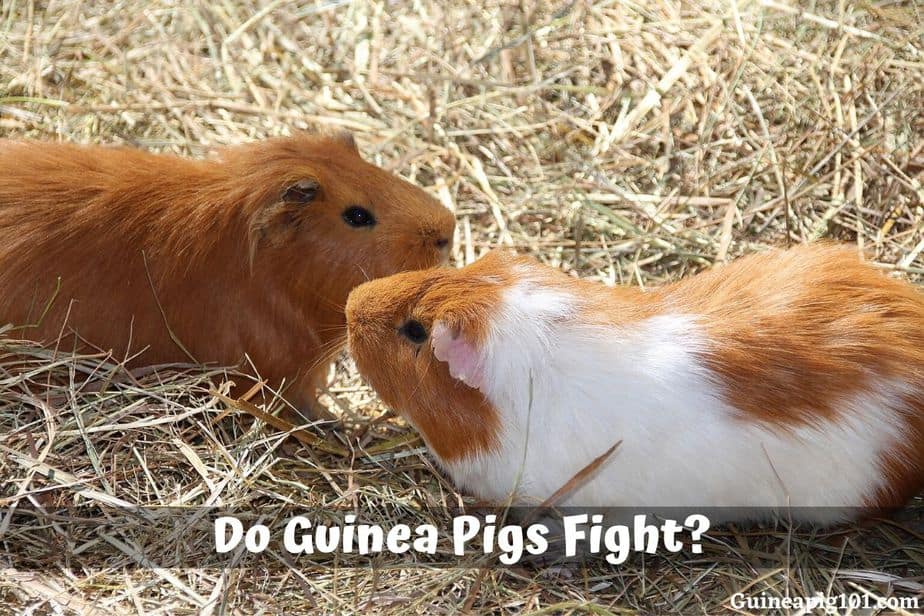Guinea pigs have moods, and they also show a change in behavior accordingly. They tend to recall their previous knowledge of conflict with fellow ones or others. You may wonder when you observe your guinea pigs start fighting suddenly without any reason, although they haven’t fight for days earlier. So, why do guinea pigs fight? And can it be deadly?
I did some research and also consulted some experts and here is what I have learned.
Guinea pigs usually fight to prove their dominance over other cagemates. Sometimes, they also compete for scarce resources like treats, hideouts, etc. A fight between two male guinea pigs can be fatal when one is physically superior to another according to size or age.
Fights between two female guinea pigs rarely result in the death of either compared to the male ones.
Multiple factors determine the risk of arguments, few among them are, one guinea pig being younger, or one guinea pig being older.
A male guinea pig (boar) will fight to prove its superiority for the right to breed with a female guinea pig (sow).
This way, it is possible to check that only the strongest and healthiest male guinea pigs will produce the next generation.
Why do guinea pigs fight with each other?
| Gender | Cause | Solution |
|---|---|---|
| Male vs. Male | – Compete to breed with female counterpart – To control its territory – Boredom – One guinea pig is larger than the other – Struggle for food | – Neuter – Include activities like toys, tunnels and hiding places – Routine based feeding – Separate the guinea pigs if fighting continues |
| Female vs. Female | – One guinea pig is larger than the other – One guinea pig is older than the other – One guinea pig is more aggressive – Struggle for food | – Keep guinea pigs of different age separate – Routine based feeding |
| Female vs. Male | – Female isn’t interested in mating – One breed is larger than the other – Struggle for food | – Separate the two guinea pigs – Routine based feeding |
Why are my male guinea pigs fighting all of a sudden?
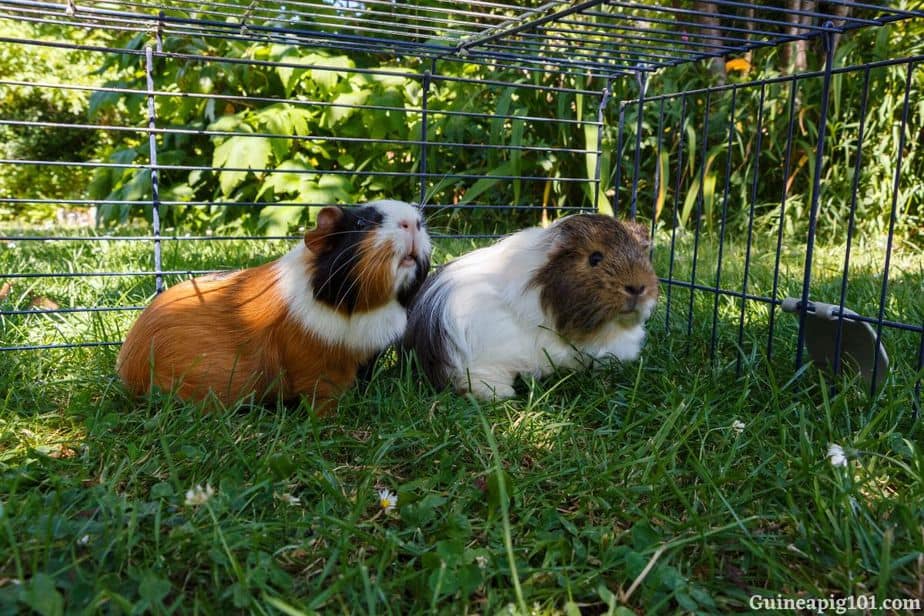
Guinea pigs sexually mature incredibly fast within 3 to 5 weeks. At the onset of puberty, the two male guinea pigs are more likely to fight. So it is better to keep them separate.
After attaining sexual maturity, the male guinea pig shows aggressiveness and wants to dominate its territory. That is all because of hormonal changes and mood swings due to sexual needs.
The fight among the male guinea pigs for the right to breed with female guinea pigs is commonly seen in guinea pigs.
The increase in testosterone level and eagerness to mate with female counterparts results in the fight among the male guinea pigs. The winner is eligible to breed with a female guinea pig or a group of them.
These fights may result in the death of the guinea pig. Injuries are common in these fights to both the guinea pigs.
This fight to prove the right to breed is a natural way to promote healthy guinea pigs in the reproduction process. Those who are healthy and strong are allowed to participate in the reproduction process.
Territorial Behavior in Guinea pigs
The onset of puberty in guinea pigs brings in many behavior changes, especially with territory dominance.
The availability of food also results in the fight of the male guinea pigs. They fight for the feeding grounds if the food available isn’t enough for them.
The guinea pigs protect their area with all possible aggression. The territory under their dominance may still be small. It is a matter of concern for them. Their aggressive nature towards other fellow ones is expressed by rumbling, circling, and mounting.
Removing the reproducing organs or sterilizing them reduces the aggressive nature among guinea pigs.
Fights are common between the comparable ones, till they don’t have the social hierarchy among themselves. As the guinea pigs understand their role and abide by the senior ones, the fights are rarer.
That is why only one male guinea pig is kept with the female guinea pigs in a cage. The presence of another male partner creates insecurity for both of them. They begin to defend their territory. That often results in a deadly fight between the two.
Why are my female guinea pigs fighting?
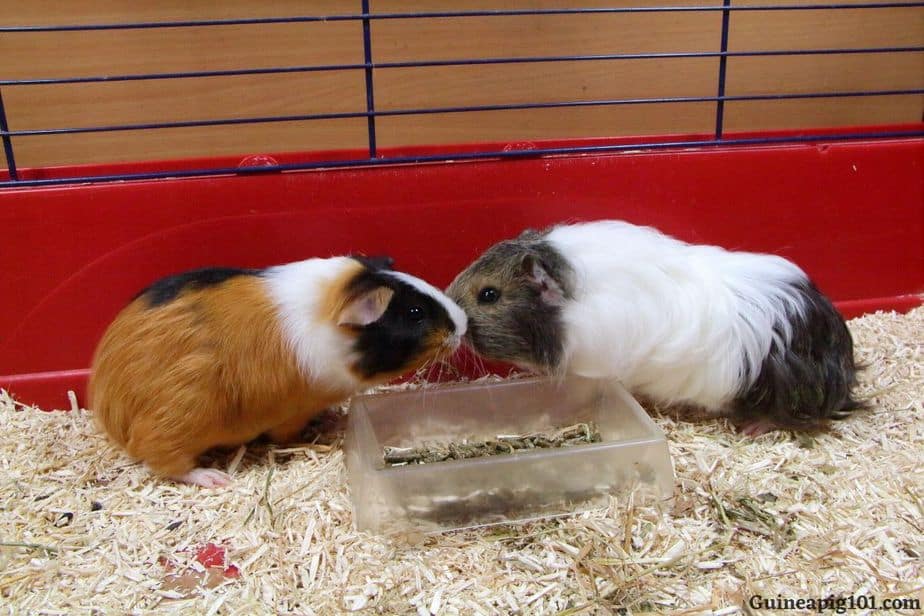
The fight between two female guinea pigs is far less deadly than compared to the male guinea pigs.
It has been observed that the female guinea pigs do not fight for the dominance of territorial regions.
They are comfortable sharing the same space with other female guinea pigs. In rare cases, the female guinea pigs fight each other to the extent of death.
The presence of any advantage or any disadvantage results in the fight among the female guinea pigs.
The female guinea pig is at an advantage if it is older or of a larger breed, whereas it is at a disadvantage if it is weak and too old to dominate.
The introduction of a new female guinea pig in the cage also results in the fight with the other female guinea pigs.
To protect the guinea pigs, it is advised to separate them if they fight among themselves. Try to make them friendlier with each other.
If they continue to fight after reintroduction to each other, then you should plan to separate them permanently.
Why are my male and female guinea pigs fighting?
The fight between a male and a female guinea pig happens rarely.
When a male guinea pig willing to mate with a female guinea pig, but the female guinea pig does not give proper response or consent.
The female guinea pig may show little aggression against the breeding. That may result in fights among them. Such arguments are not so severe and don’t cause much damage.
The fight between any two guinea pigs, whether between two females or a male and a female, should not be ignored. You should carefully observe any hostile behavior between the two guinea pigs.
Some common reasons of fight among guinea pigs are:
Boredom in guinea pigs
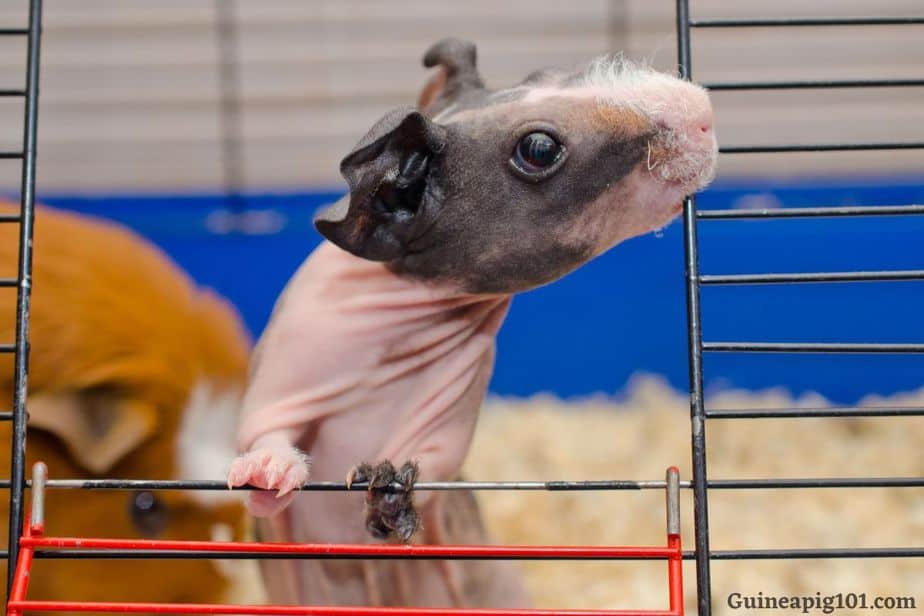
Guinea pigs always like to do physical activities like hiding, running through tunnels, toys, etc. These activities stimulate them and keep them engaged.
Guinea pigs become frustrated if they don’t find enough space to play and not many things to do, which then is seen as aggressive nature towards the fellow ones.
A fight for Delicious Food
The competition for food is another factor that results in a fight between guinea pigs.
If the available food is not enough for them or one among them is greedy than others, the fight is going to happen.
Guinea pigs are accustomed to a routine. The change in the regular activities schedule like feeding timings can also result in aggression.
The cage of the guinea pigs is likely to be found full of furs that your guinea pigs might pull out.
The behavior of guinea pigs is aggressive whenever the owners leave their pets while on vacation. A caretaker or your family member looking after them might not serve them the right food or at the right time.
Late Introductions of cage mates
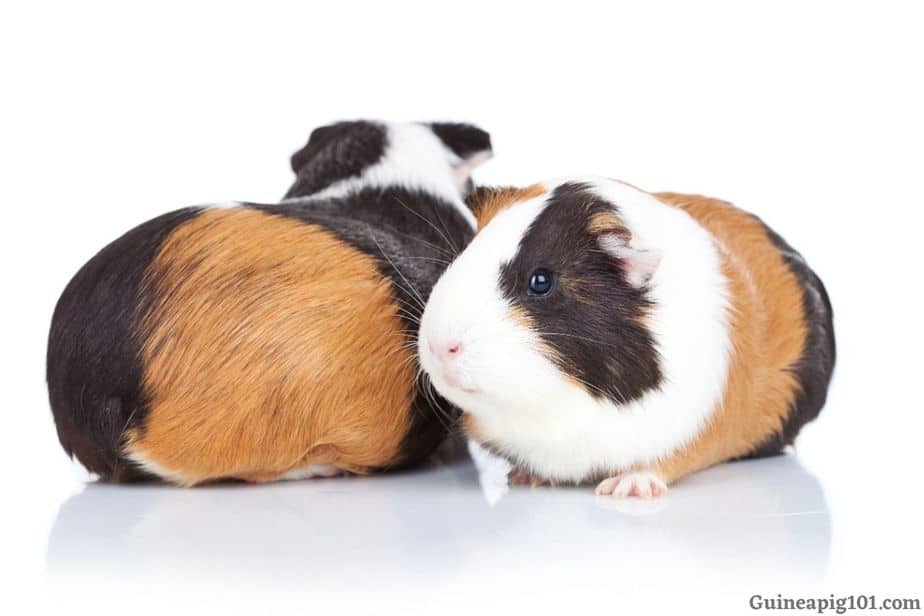
Guinea pigs staying in large independent space may still have some area overlapping with the other guinea pigs.
At times there is no behavior change of the guinea pigs in response to the scent neighborhood guinea pig, but when a new guinea pig is introduced, they tend to discriminate against the stranger.
Early introduction during the initial phase of life or before sexual maturity is the best time.
To avoid unnecessary aggressive attitudes, neutering is a must. Guinea pigs often tend to fight when introduced later in life.
The new guinea pig should be introduced to the existing ones in a phased manner. The guinea pigs are susceptible to their territory. The invasion of any new member is not acceptable. Direct introductions of the new member can result in deadly fights.
If a new member is a baby guinea pig, its direct introduction to the older and stronger ones is more dangerous. Young guinea pigs don’t have a chance against old and mature guinea pigs.
Guinea pigs need time for close bonding, so they must be assisted for this. Any sudden introduction to a new member is not welcome. The guinea pigs can get stressed and you might have adverse outcomes from the change.
Do guinea pig siblings fight?
The young guinea pigs are more comfortable with the young ones. The guinea pigs should be introduced to each other at younger ages to avoid any fight, and they tend to develop good bonding.
There are instances of a fight between the siblings but those are more small ones. Care should be taken that they do not involve in any violent battle.
It is during the age of adolescence the brawl is observed between the two.
They usually mingle up again and mend their bonding by themselves; if the fight continues, they should be separated.
Are my guinea pigs fighting or playing
The guinea pigs often have minor disputes and fights among themselves.
But these do not do much damage like those which lead to death. Once the bond between guinea pigs is broken due to fighting, it is hard to bring them back together.
Guinea pigs are blessed with a sharp memory. They remember the fight with fellow ones. It has been observed that few guinea pigs are staying comfortably for a long time and suddenly become aggressive.
The day to day struggle between the guinea pigs is different from the deadly fights. Keep a close eye on their actions. The regular disputes don’t require any human intervention, and they start playing again.
It is better not to intervene between the fights of the guinea pigs. It’s when they are aggressive that they can harm each other. We should speak to end things immediately.
Acceptable Behavior in guinea pigs

The frequent friendly fights among the guinea pigs are:
Rumbling, chasing, and retreating: These are ways of expressing uneasiness or dispute with others. If it is done repeatedly and again with the intent to harm others, it is a matter of concern. They usually show such behaviors among each other to communicate with actions.
Mounting: This behavior is typical among guinea pigs to show dominance on the other one. It is not usual between two male guinea pigs where one tries to dominate the other, whereas in other cases, it is a sign of acceptance as a partner.
Nipping: It is non-verbal communication among guinea pigs warning others to stop something. Instead of nipping if it is biting to harm others is not usual and needs intervention.
Nose bumping: This is also non-verbal communication to get the attention of the partner.
Following each other: A guinea pig having a bond with the other guinea pig follows each other while playing. It is to observe that they are not aggressively chasing each other to harm.
Unacceptable Behavior in guinea pigs
It is essential to distinguish between minor tiffs and deadly fights. The following signs should be looked to figure out the unacceptable behavior:
Chasing: The guinea pig aggressively follows another guinea pig; they should be separated immediately.
Bites: The guinea pigs bite may result in bleeding occasionally. The bitten marks are visible, and the fur ripped off. The skin tears in extreme cases. These actions not only cause harm to the guinea pigs but also increase the chances of infection.
Rough mounting or persistent mounting: The dominant guinea pig bites and thrashes the other guinea pig while mounting. These indicate hostile behavior.
Circling: An excited guinea pig starts circling in any direction. When this is done persistently in the manner of chasing the other guinea pig, it is abnormal.
Grunting: A visible sign of an angry guinea pig, they grunt and express their aggressiveness.
All other actions which may cause harm to the guinea pigs.
What should I do if my guinea pigs are fighting?
The guinea pigs are playing among themselves, but suddenly, you observe that they are fighting fiercely. The warm environment and bond between the guinea pigs are lost.
One guinea pig is trying to escape the grip of the other. They are making loud noises and trying to hump and mount each other.
So, here are the steps to follow when you find your guinea pigs fighting.
Don’t Ignore the Fight
A common belief is that guinea pigs bonded to each other will never fight. Even if they are fighting, it is assumed that they are playing or having a minor struggle. But this may not be true every time.
The guinea pigs can severely harm each other while fighting. Apart from the physical damage to the guinea pigs, it will eventually cost you with increasing veterinarian bills.
Fur spread on the floor or in the cage and the guinea pigs aggressively following each with an attempt to bite is a clear indication of the guinea pigs fight.
Make a Loud Noise
Producing a high pitched sound by clapping and squeaking or blowing a whistle can stop the guinea pigs from fighting. Keeping the whistle nearby is also a good idea.
A high pitched or shrill sound gives stress to stop the ongoing activity of the guinea pigs. The bonded guinea pigs often position themselves tightly when afraid of something.
It is used when guinea pigs not familiar to each other are taken for a ride.
At times when the guinea pigs are involved in serious fights, producing sharp sound is also not good enough to stop them.
Separate Them Immediately
The guinea pigs need to be separated if they don’t stop fighting in response to the loud noise produced. While separating, wrap your hand with a towel to protect it from any bites or scratches.
Guinea pigs fight with lots of vigor and may keep fighting until one succumbs to death. So it is good to separate them and be cautious even if the guinea pigs are bonded to each other.
Never ever use your bare hands to stop your guinea pigs from fighting. This can result in scratches and bites which can even bleed.
Assess Your Guinea pigs for Injuries
A complete survey of the body parts is essential to identify any injuries. The injury is sometimes not visible due to their fur. Observe the movements of the guinea pig. Is it able to walk properly?
Take your guinea pigs to a veterinarian as soon as possible when you observe injury. The guinea pig should be allowed to calm down while you check for the damages. It will lick the injured part, so look for those parts.
Keep Your Guinea pigs Separated
Guinea pigs need to be separated for some time or as long as required. They have sharp memories and remember their fight.
Even a brawl of a few seconds can end the close bond between guinea pigs just because of their inability to forget things. Keep your guinea pigs separated for a few hours or more as needed.
The guinea pigs are unable to bond again once they are engaged in a fight. They should not be put in one cage after the fight. Likely, they may fight back even more violently.
Separate guinea pigs with separator:
The guinea pigs are separated by a separator or some other way, such that they can touch each other and communicate only. They cannot fight with each other as they are unable to come close enough to each other, helping them to live smoothly.
In extreme cases, they may continue to fight even though the small pockets of the separator. If the fighting persists after putting a separator, then they should be kept apart in different spaces.
The separator can be temporarily blocked by covering it with a towel. That doesn’t allow the guinea pigs to see each other.
After some time, when they calm down, the cloth is removed to interact with each other again. Still, they should be observed, for they don’t start fighting back.
Closely bonded guinea pigs have chances that they come together again. They should be separated for a few hours or a day and then allowed to mend the bond.
Guinea pigs can keep the unfortunate experience of the fight in their memory for more extended periods. The good memories of the mate are replaced with harsh ones.
The measures should be taken to minimize or to avoid violent fights. A continuous brawl among the ones closely bonded guinea pigs can give stress to the owner.
What to do if guinea pigs injure each other while fighting
The guinea pig should be separated immediately if it gets hurt during the fight. Examine the injury. If it’s severe, then visit your veterinarian.
Guinea pigs that hurt each other badly must be permanently separated.
After such an intensive fight, it is impossible to make them bond again.
Guinea pigs of different ages or sizes can be kept together but with all possible precautions.
The smaller or younger guinea pig is potentially at higher risk of getting hurt by the dominating elder or stronger guinea pig.
Guinea pigs of larger size can attack the smaller one if kept together. They should be closely watched for any involvement in a fight. It is a common problem among guinea pigs.
How to stop your guinea pigs from fighting
The bond between guinea pigs can be improved through the following steps:
- Keeping them in a new place that they are not familiar with.
- Once there has been a fight between the guinea pigs, they should be carefully observed when kept together. Their body movements and actions should be monitored to prevent any further battle.
- Guinea pigs that were once tightly bonded take time to develop the bond again. One of them will mount on the other to determine the dominance and submissive nature.
- A pleasant smell promotes mutual grooming between the guinea pigs during redefining bonding with each other. Rub their fur with any herbs having strong essences like parsley, cilantro, or dandelion.
- Avoid any cooking spices, perfumes, or any powders as it may have adverse effects on the health of the guinea pigs.
- The guinea pigs should be fed together. They can be offered a special treat of their choice.
- A time span of at least 1-2 hours should be provided for the guinea pigs to build bond again. If no fight is seen in this time, then such sessions can be tried yet until they form a strong bond to live together.
- The time required may vary for different guinea pigs from a couple of hours to an entire night.
- They should be provided with a small space for interactions with each other and prevent them from chasing each other.
I hope this can help you understand and learn more about your guinea pigs.
Source: Fight or flight, The effect of human interaction on guinea pig behavior, Reduction in aggression and dominance status in guinea pigs, Guinea Pigs: Aggression and Dominance, Social confrontation in male guinea pigs, The environment, hormones, and aggressive behavior: a 5-year-study in guinea pigs, Effects of domestication on guinea pigs.
